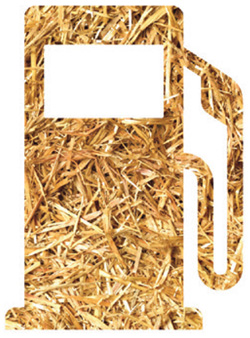 With CO2 emissions continuing to grow in the transport sector, EU institutions are looking at renewables such as biofuels to decarbonise the mobility sector. Currently, a number of directives regulate the use of biofuels in the EU, among them the "Renewable Energy Directive" (RED) and the "Fuel Quality Directive" (FQD). In November 2016, the European Commission proposed - as part of its energy and climate goals strategy - a revised Renewable Energy Directive (commonly referred to as "REDII"). REDII stipulates that, by 2030, at least 27% of all the energy used in the EU have to be produced from renewable sources. In January 2018, the EU Parliament recognized the need for advanced biofuels produced from agricultural residues in order to reduce greenhouse gas emissions in transportation. A vote was taken calling for a specific 12% target for renewables in the transport sector by 2030, 10% of which should come from advanced biofuels and other low-carbon fuels. This proposal of the EU Parliament sets the right direction for creating a stable and predictable business environment in order to trigger investments in advanced biofuel production within the EU. If the proposal prevails in the negotiations with the Council of Ministers and the European Commission, it will bring many benefits: significant greenhouse gas savings, the creation of thousands of new green jobs and a sustainable and competitive source of domestic renewable energy for the EU.
With CO2 emissions continuing to grow in the transport sector, EU institutions are looking at renewables such as biofuels to decarbonise the mobility sector. Currently, a number of directives regulate the use of biofuels in the EU, among them the "Renewable Energy Directive" (RED) and the "Fuel Quality Directive" (FQD). In November 2016, the European Commission proposed - as part of its energy and climate goals strategy - a revised Renewable Energy Directive (commonly referred to as "REDII"). REDII stipulates that, by 2030, at least 27% of all the energy used in the EU have to be produced from renewable sources. In January 2018, the EU Parliament recognized the need for advanced biofuels produced from agricultural residues in order to reduce greenhouse gas emissions in transportation. A vote was taken calling for a specific 12% target for renewables in the transport sector by 2030, 10% of which should come from advanced biofuels and other low-carbon fuels. This proposal of the EU Parliament sets the right direction for creating a stable and predictable business environment in order to trigger investments in advanced biofuel production within the EU. If the proposal prevails in the negotiations with the Council of Ministers and the European Commission, it will bring many benefits: significant greenhouse gas savings, the creation of thousands of new green jobs and a sustainable and competitive source of domestic renewable energy for the EU.
SUNLIQUID® – COMPETITIVE AND SUSTAINABLE CELLULOSIC ETHANOL
Advanced biofuels such as cellulosic ethanol can be used in today’s car fleet within the current energy infrastructure. The technology for the production of cellulosic ethanol is mature. One example for such an innovative technology is Clariant’s sunliquid® process. Sunliquid®-based cellulosic ethanol achieves CO2 emission savings of up to 95% compared with fossil fuels. The co-product lignin from the process is used for renewable energy production and the vinasse for soil fertilization, which makes the process energy self-sufficient and highly sustainable and provides a tangible example of a circular economy.
In October 2017, Clariant announced its plans to invest in a new full-scale commercial flagship production plant for cellulosic ethanol made from agricultural residues based on the sunliquid® technology. The new plant with an annual production capacity of 50,000 tons cellulosic ethanol will be built in a rural area in the southwest of Romania. At full capacity, it will process 250,000 tons of agricultural residues like straw annually, which will be sourced from local farmers. Tapping into the full potential of plants, the sunliquid® process makes use of currently underutilized inedible biomass and thus contributes to optimizing the efficiency and sustainability of biofuels. The use of agricultural residues in the immediate vicinity promotes local fuel production. Furthermore, it creates green jobs and economic growth in predominantly rural areas that might be struggling with underemployment and economic downturn.
Clariant's flagship plant shows that the production of advanced biofuels provides many benefits. In the upcoming negotiations on REDII, it is essential that the EU institutions agree on a binding target for advanced biofuels for 2030, to make headway in decarbonising transportation and reach global climate protection goals. This will also create a strong framework for investments in sustainable, innovative technologies and production facilities in the EU.
Contact Details:
Dr. Markus Rarbach
Head of Business Line Biofuels & Derivatives
Clariant Produkte (Deutschland) GmbH
T: +49 (0)89 710 661 0
email: E: contact@sunliquid-project-fp7.eu
web: www.sunliquid-project-fp7.eu
This article has been published within the framework of the EU project SUNLIQUID which receives funding from the European Union's Seventh Framework Programme (FP7/2007-2013) under grant agreement no. 322386.